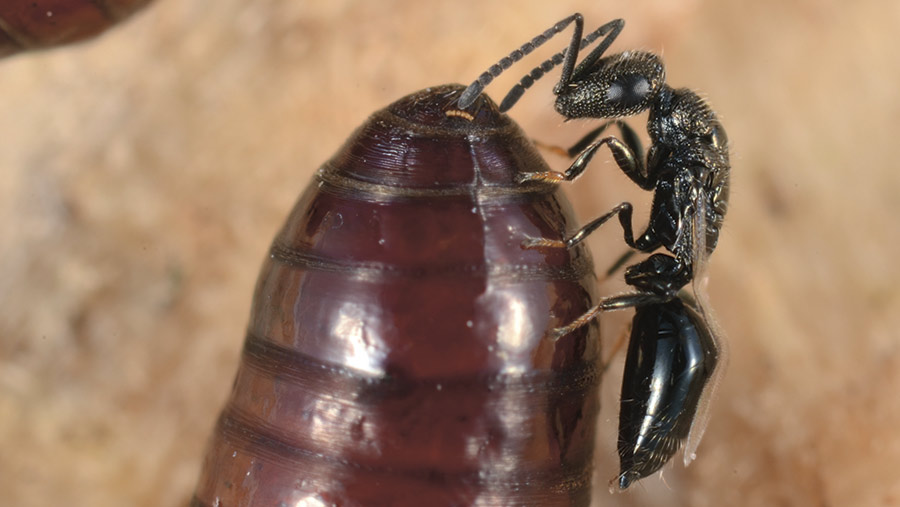Natural fly control offers way to cut pesticide use

Cattle farmers could prevent disease caused by nuisance flies this summer using a natural parasitic control programme.
Available through vet practice Lambert, Leonard & May (LLM), the control programme, called Friendly Flies, involves parasitic flies bred in Texas and introduced on UK farms by trained veterinary technicians. The flies then inhibit the breeding population of nuisance flies.
With pressure mounting on chemical use on farm, Mark Hickinson from LLM says the programme also offered farmers the opportunity to reduce reliance on chemical-based products by adopting a more natural approach to fly control.
See also: 4 tips to improve working conditions on your dairy unit
“We don’t want [pesticides] taken away from us so we need to be careful and clever about how we use all of these things,” he said.
“Friendly Flies provide a natural, long-term, cost-effective solution to reducing the use of traditional potentially hazardous chemicals including pyrethrins and pyrethroids which are non-specific and after continued use can demonstrate evidence of resistance build-up.”
Reducing disease
He said farmers should be prepared to spend a similar amount to what they would spend on chemical products.
However, the biggest cost saving could be made by reducing diseases such as summer mastitis and New Forest Eye – two diseases spread by biting and nuisance flies, he said.
LLM vet Bill May added: “With summer mastitis, more often than not, a quarter is lost which is a massive impact on [milk] production.”
Case study: spend and efficacy
Dale Whalley milks 300 cows in Knutsford, Cheshire. He has been using the programme for seven years and has reduced his chemical spend from £851.20 to £144.40.
The total cost saving is brought down to £69.80 when the cost of Friendly Flies is factored in at £637 a year.
However, when the 12 fewer cases of summer mastitis were taken into account, at £100-350 a case, the programme was very cost effective, Dr Hickinson said.
“You would spend slightly more in the first year to get things established than you would in subsequent years,” he conceded.
In year one, Mr Whalley’s fly control spend was around £800.
“His expenditure is now lower because he has dropped down to one bag [of flies] every two weeks,” Dr Hickinson said. The fly parasites become a little bit sustainable and you have reduced the nuisance fly population.
“You can back off after a few years depending how clear your farm is,” he added.
Timing control
Dr Hickinson said the best time to introduce the flies was now, before nuisance flies started to hatch.
“It is better to start this time of year, so they establish a breeding population and get in front of the nuisance flies,” he explained.
Cost
Flies are sold in bags; one bag costs £49.50 including support from technicians. As an estimate, one bag is required per 100 cows. However, this is dependent on farm size, cleanliness and fly severity. Bags need topping up every two weeks.
Parasitic flies can be killed in cold weather so the programme should be carried out annually.
LLM would like to work with vets in other parts of the country to make the service more widely available.
For more information email info@llmvets.co.uk
